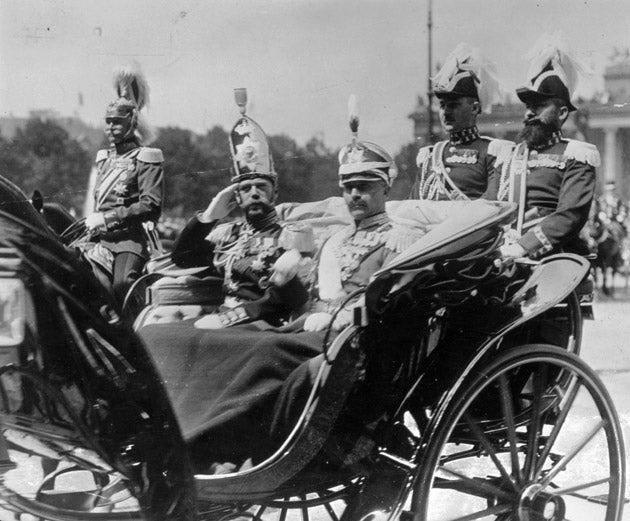The Three Emperors, By Miranda Carter

"When so markedly eccentric a nature dominates a realm there cannot but be convulsions." So commented Philipp zu Eulenburg, one of Kaiser Wilhelm II of Germany's few friends. His remark encapsulates the problem with autocracy, the danger of allowing a single, flawed, human being to exercise absolute, or near absolute, power.
Part of Miranda Carter's argument in The Three Emperors: three cousins, three empires and the road to the First World War is that the autocratic cousins, Kaiser Wilhelm and Tsar Nicholas II (known to each other as Willy and Nicky) were not always quite as powerful as they thought they were. Nevertheless, they still exercised a lot more of the real thing than did the third cousin, King George V (or Georgie).
The Kaiser was the most volatile of the three, afflicted with the lethal combination of an inferiority complex and a desire to dominate, and exhibiting many symptoms of what Carter defines as a "narcissistic personality disorder". Another of our contemporary "disorders" which seems to have afflicted Willy was "attention deficit hyperactivity". Carter quotes foreign minister Marschall saying of him: "It is unendurable. Today one thing and tomorrow the next and after a few days something completely different."
Though his cousin Nicholas may have appeared similar – it often looked as though he agreed with whoever had spoken to him last – his particular flaw was a refusal to change with changing times. For the Tsar firmly believed that his autocracy was God-given, and that any challenge had to be ruthlessly stamped out.
By contrast, Georgie's flaws seem as insubstantial as his power as a constitutional monarch, for they really amounted to little more than a certain dullness and plodding predictability. Carter opines that he may also have been dyslexic. In addition George, trained as a sailor, was less addicted to military paraphernalia than either of his cousins, who shared an inherited love of uniforms and parades – "standing at the head of a company feeling splendid," as Carter succinctly puts it.
Carter, whose previous book was Anthony Blunt: his lives, is a gifted story-teller and has written a very readable account of this fairly well-trodden ground. She is particularly convincing in arguing the case for the inevitability of the First World War, given the characters of the central players and the rapaciousness of colonising empires.
But there is little to distinguish this book from another, published less than three years ago: Catrine Clay's King, Kaiser, Tsar. Clay's book is not mentioned in Carter's bibliography, so presumably neither she nor her publishers knew it.
Nevertheless, the story is fascinating enough to bear re-telling. In addition to the three cousins, many other relatives have vital parts to play. One of the most sympathetic is George's father ("Uncle Bertie" to his cousins and Edward VII to us), the only one among this band of royals to be good at PR, and a real support to Nicholas at the time of his accession, travelling to St Petersburg to help organise Alexander III's funeral.
There are the two formidable Danish sisters, Alexandra (Alix) and Dagmar (Minnie), both "Motherdear" to their respective sons, Georgie and Nicky. And until 1901 there is the emphatic presence (her exhortatory letters full of capitals and underlinings) of "Granny", otherwise known as Queen Victoria - and less respectfully by Nicky as the "unsteady ball on legs" or even, in a letter to his brother which is quoted by neither Carter nor Clay, as "belly woman".
The importance that Queen Victoria placed on what Carter aptly calls "the cult of family" came under pressure throughout the lives of her grandchildren, and was dealt its death blow in 1917, when George played an active part in persuading the British government to withdraw its offer of asylum to "dear Nicky", his wife and children. This must be one of the most ignominious passages of British royal history, but Carter has nothing new to tell us about it, the full story having been known for some time.
Perhaps there was little that could have been done, and other forces than the King's pusillanimity were at work to prevent the survival of the ex-Tsar. Perhaps George had a stronger grasp on reality – more political sense, in fact – than either of his cousins.
In the end, dullness and pragmatism triumphed, the least glamorous and powerful of the three emperors being the only one to hold his throne. Despite his association with "Victorian" and "family" values, it was arguably by ditching those values that he and the British monarchy – that "domestic, decorative, ceremonial, stolid creation it is today" – remained intact.
Virginia Rounding's biography of Catherine the Great is published in paperback by Arrow
Join our commenting forum
Join thought-provoking conversations, follow other Independent readers and see their replies
Comments
Bookmark popover
Removed from bookmarks